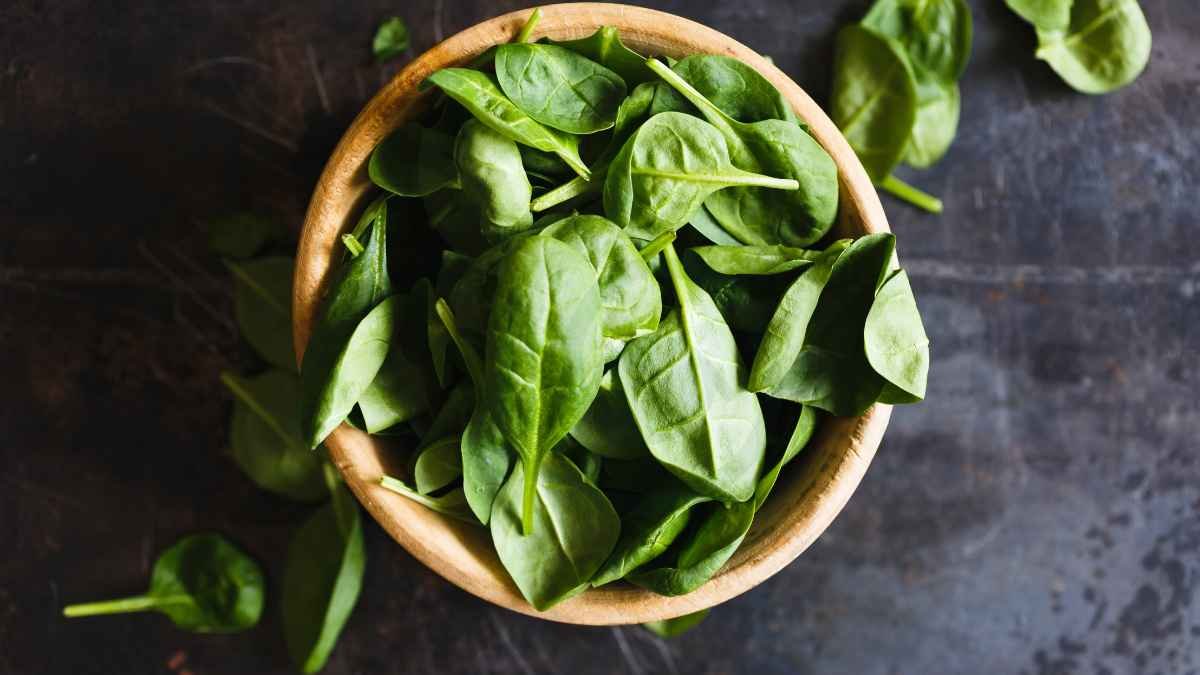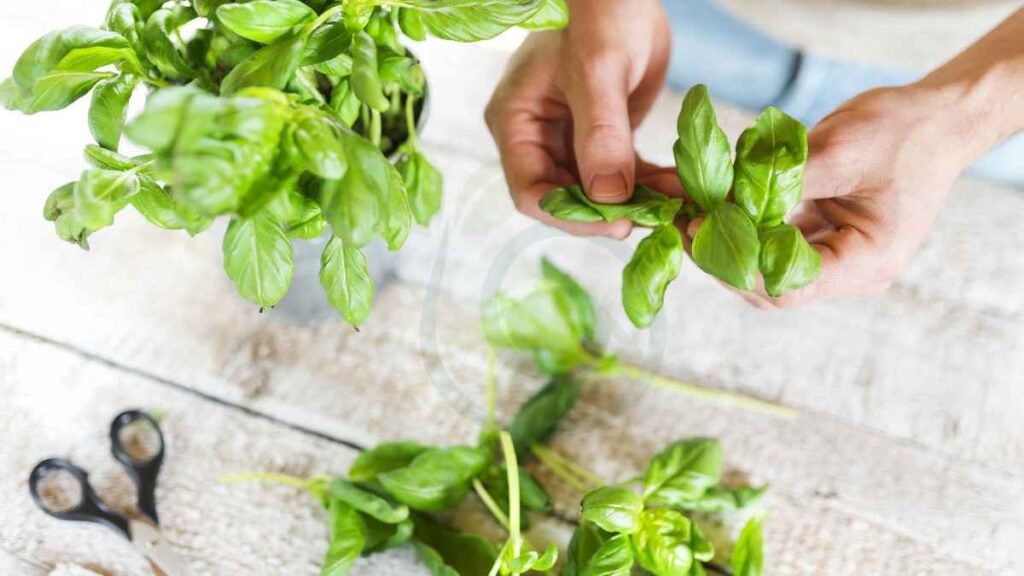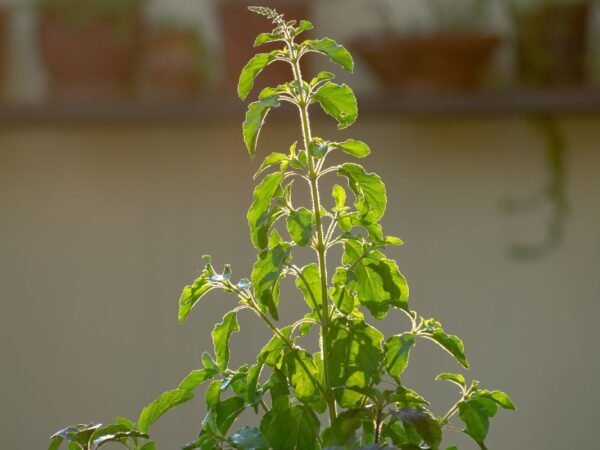
Can you eat basil leaves? Yes, you can! Basil leaves are not only a popular herb used in cooking but also safe to consume.
Basil leaves, known for their distinct flavor and aroma, are essential oils and spices used in various cuisines worldwide. They are rich in essential nutrients such as vitamin K, manganese, and antioxidants. While basil, like other herbs, is typically used as a flavoring agent in dishes like pasta, salads, and sauces, it can also be consumed raw or blended into smoothies for added health benefits. However, excessive consumption may cause stomach discomfort in some individuals. Overall, incorporating basil leaves into your diet can enhance both the flavor and nutritional value of your meals.
Ready to explore the diverse culinary uses, essential oils, and health benefits of basil leaves? From traditional Italian recipes to modern fusion dishes, there's a world of culinary creativity waiting for you to discover with basil as a star ingredient. Whether you're a seasoned chef or an amateur cook, there's always more to learn about the versatile and flavorful herb known as basil.
Key Takeaways
- Enjoy the Benefits: Incorporate basil leaves into your diet to benefit from their antioxidant and anti-inflammatory properties, essential oils supporting overall health.
- Moderation is Key: While basil is safe for most people, it's advisable to consume it in moderation to avoid potential side effects like allergic reactions.
- Skincare Saviour: Consider using basil in skincare routines for its antibacterial and anti-inflammatory properties that can help with acne and skin conditions.
- Nutrient Boost: Basil leaves are not only flavorful but also rich in essential nutrients like vitamin K, vitamin A, and iron, contributing to a balanced diet.
- Watch for Side Effects: Be mindful of potential side effects such as interactions with medications or allergic reactions, especially if you have existing health conditions.
- Get Creative in the Kitchen: Experiment with basil in various dishes to add a fresh, aromatic flavor that complements both sweet and savory recipes.
Basil Leaf Benefits
Health Advantages
Basil leaves offer various health benefits such as improving kidney function and treating digestive issues. The anti-inflammatory properties of basil leaves can help combat inflammation in the body.
Consuming basil can aid in improving kidney function by promoting proper filtration and reducing the risk of kidney stones. Basil is known to be effective in treating digestive issues like bloating and indigestion due to its carminative properties.
Medicinal Uses
Basil is utilized for its medicinal uses in treating fever, headache, and insomnia. It also plays a crucial role in improving heart health and managing diabetes effectively.
The medicinal properties of basil extend to promoting overall well-being by aiding in stress relief and improving mental clarity. Its natural compounds help in reducing inflammation, which is beneficial for various health conditions.
Skin Health
When it comes to skin health, basil can be beneficial in reducing redness and allergies. The anti-inflammatory properties of basil make it an excellent choice for skincare routines.
Basil can help improve skin conditions like rashes due to its soothing effects on the skin. Regular use of basil-infused products can lead to healthier and more radiant skin over time.
Nutritional Value
Exploring the nutritional content of basil reveals its richness in vitamins, minerals, fiber, and other essential nutrients. Basil leaves are a good source of vitamins A, K, and C along with minerals like calcium and magnesium.
Basil seeds are known for their high fiber content, making them beneficial for digestion and overall gut health. The nutrient-dense nature of basil flowers further adds to the nutritional value of this versatile herb.
Daily Basil Intake

Recommended Amount
Basil leaves are rich in antioxidants and essential nutrients, making them a valuable addition to your daily diet. For medicinal purposes, consuming around 2-3 fresh basil leaves per day is recommended. These leaves can be added to salads, sandwiches, or used as a garnish.
To ensure safety, it's crucial to limit your intake of basil leaves. Consuming excessive amounts can lead to adverse effects. The safe limit for daily consumption is generally considered to be up to 5-6 basil leaves per day. This moderate intake helps you enjoy the benefits without any risks.
When it comes to basil seeds, also known as sabja seeds, the appropriate dosage for daily intake varies. Typically, adding 1-2 teaspoons of soaked basil seeds in water or beverages like smoothies is beneficial. These seeds are popular for their cooling properties and are often used in drinks during hot weather.
Overconsumption Risks
Overconsumption of basil leaves can pose certain risks that need to be acknowledged. Excessive intake may lead to stomach irritation, nausea, or even allergic reactions in some individuals. It's essential to consume basil in moderation to avoid these potential side effects.
Consuming large quantities of basil can also result in blood thinning, which may interact with certain medications or medical conditions. Therefore, it's important to be mindful of your intake and not exceed the recommended limits. Moderation is key when incorporating basil into your daily diet.
Remember that while basil offers numerous health benefits, including improved digestion and anti-inflammatory properties, it's crucial to maintain a balanced approach towards its consumption. By being aware of the recommended amounts and potential risks associated with overconsumption, you can fully enjoy the advantages of this versatile herb.
Basil in Skincare
Topical Uses
Basil offers benefits for skin care and health, acting as a natural remedy for various ailments. Incorporating basil into skincare routines can help address common skin issues effectively. The antibacterial and anti-inflammatory properties of basil make it a valuable ingredient in topical treatments.
Using basil in DIY remedies is popular due to its ability to soothe skin irritations and promote healing. It can be applied topically to alleviate conditions like acne, eczema, and psoriasis. Infusing basil leaves in oils or using them directly on the skin can enhance its therapeutic effects.
The benefits of using basil topically extend to treating insect bites, reducing inflammation, and promoting wound healing. Its antioxidant properties help protect the skin from damage caused by free radicals. Incorporating basil into skincare products can improve overall skin health.
DIY Remedies
Homemade remedies using basil are effective for addressing common health issues naturally. Creating DIY treatments with basil leaves and seeds is simple yet powerful in managing skin conditions. Basil's medicinal properties make it a versatile ingredient in natural remedies.
DIY treatments with basil can include face masks, toners, and infused oils for various skin concerns. Mixing crushed basil leaves with honey or yogurt can create a soothing mask for acne-prone skin. Infusing basil seeds in water can produce a hydrating gel for dry skin.
Incorporating basil into homemade skincare products allows individuals to tailor treatments to their specific needs. From reducing redness and inflammation to improving overall skin texture, basil offers a holistic approach to skincare. Its versatility makes it a valuable addition to any natural skincare routine.
Basil Leaf Nutrition
Vitamins and Minerals
Basil leaves are rich in vitamins like vitamin K, essential for blood clotting and bone health. They also contain minerals such as iron, calcium, and magnesium. These nutrients support overall well-being.
Basil provides a good amount of vitamin A, crucial for vision and immune function. It offers vitamin C, an antioxidant that boosts immunity. The presence of magnesium in basil aids in muscle and nerve function.
The nutritional value of basil extends to iron, which is vital for oxygen transport in the body. Consuming basil can help maintain healthy levels of this essential mineral.
Antioxidant Properties
Basil leaves possess powerful antioxidants that combat oxidative stress in the body. These antioxidants protect cells from damage caused by free radicals, promoting overall health.
The antioxidant properties of basil contribute to reducing inflammation and lowering the risk of chronic diseases. Regular consumption of basil can enhance the body's defense mechanisms against harmful toxins.
Side Effects of Basil
Potential Risks
Consuming basil may pose potential risks, particularly for individuals with certain medical conditions. It's crucial to be aware of these risks and take necessary precautions. Consulting a healthcare professional before using basil medicinally is highly recommended.
e potential risks associated with basil consumption include interactions with medications, especially blood thinners like warfarin. Precautions should be taken when using basil for its health benefits, especially if you have underlying health issues.
Allergic Reactions
While rare, allergic reactions to basil can occur in some individuals. Symptoms of an allergic reaction to basil may include skin rashes, itching, swelling, or difficulty breathing. Identifying and managing allergic reactions promptly is essential.
If you experience any unusual symptoms after consuming basil, seek medical attention immediately. Allergic reactions can vary in severity from mild discomfort to life-threatening situations. It's important to recognize the signs and respond accordingly.
Cooking with Basil
Culinary Uses
Basil leaves are widely used in various cuisines, adding flavor and aroma to dishes. They are versatile in enhancing the taste of both savory and sweet dishes. Incorporate basil leaves into pasta sauces, salads, soups, and even desserts for a fresh and aromatic touch.
When it comes to culinary uses, basil leaves can be used fresh or dried in cooking. Fresh basil leaves are commonly added at the end of cooking to preserve their fragrance. In contrast, dried basil is perfect for long-cooking dishes like stews and sauces.
Recipe Ideas
Get creative with basil leaves by using them as a key ingredient in various recipes. Prepare classic Italian dishes such as Caprese salad with fresh tomatoes, mozzarella cheese, and basil leaves drizzled with olive oil. For a refreshing twist, make watermelon feta salad with basil for a unique flavor combination.
Experiment with pesto sauce by blending basil leaves, pine nuts, garlic, Parmesan cheese, and olive oil for a vibrant and flavorful sauce. Use this pesto on pasta, sandwiches, or as a marinade for grilled meats. Another idea is to infuse basil into lemonade or cocktails for a refreshing summer drink.
Basil Beyond the Kitchen
Essential Oil Benefits
Basil essential oil offers aromatherapy benefits by promoting relaxation and reducing stress levels effectively. The aroma of basil oil can create a calming atmosphere, aiding in stress relief. This natural remedy is known for its therapeutic properties that contribute to overall well-being.
On top of its aromatic advantages, basil essential oil has numerous health benefits. It is widely used in aromatherapy to induce a sense of calmness and relaxation. The flowers of the basil plant are distilled to extract this potent oil, which can be diffused or applied topically for various health benefits.
Tea Advantages
Consuming basil tea provides a plethora of health benefits beyond its culinary use. Basil tea is renowned for aiding in digestion and promoting relaxation due to its natural properties. The soothing effects of basil tea make it an excellent choice for enhancing overall wellness.
Basil tea offers a refreshing way to enjoy the herb's benefits, providing a soothing experience that promotes relaxation and well-being. The tea can be consumed hot or cold, making it a versatile option for incorporating into your daily routine.
Unique Basil Varieties
Sweet vs. Holy Basil
Sweet basil, known for its mild and slightly peppery flavor, is commonly used in Italian cuisine for dishes like pesto. On the other hand, holy basil, with its spicy and clove-like taste, is prominent in Thai and Indian cooking. Distinguishing between the two is crucial for achieving the desired culinary outcome.
When it comes to medicinal purposes, sweet basil is often used for its anti-inflammatory properties, while holy basil is valued for its stress-relieving and immune-boosting benefits. The distinct flavors and health benefits make each type of basil unique in its own right.
Choosing the Right Type
To select the appropriate basil variety, consider your specific needs - whether it's for cooking, herbal remedies, or ornamental purposes. Sweet basil works well in fresh dishes like salads and sandwiches due to its mild taste. In contrast, holy basil adds a spicy kick to curries and soups.
When choosing basil plants, look out for characteristics such as leaf shape, color, and aroma. Sweet basil typically has broad green leaves, while holy basil features narrower leaves with purple stems. Understanding these differences will help you identify the right type of basil for your intended use.
Best Practices for Selecting Basil:
- Consider the intended use (culinary or medicinal)
- Examine leaf shape, color, and aroma
- Choose sweet basil for mild flavors and holy basil for a spicy taste
Incorporating Basil into Wellness Routines
Daily Practices
Incorporating basil into your daily routine can be beneficial for your health. You can start by adding fresh basil leaves to your salads or sandwiches for a burst of flavor and nutrients. You can infuse water with basil leaves for a refreshing and hydrating drink throughout the day.
Consider making a list of various ways to include basil in your meals, such as adding chopped basil leaves to pasta dishes or blending them into smoothies. By experimenting with different recipes, you can find creative ways to enjoy the unique taste of basil while reaping its health benefits.
Long-term Health Benefits
Regular consumption of basil leaves can have long-term positive effects on your health. Basil is rich in antioxidants, which help protect your cells from damage caused by free radicals. These antioxidants may lower the risk of chronic diseases and support overall well-being.
By incorporating basil into your diet consistently, you may experience improved digestion and reduced inflammation in the body. The anti-inflammatory properties of basil can contribute to better gut health and enhance your body's ability to absorb essential nutrients from food.
Including basil seeds in your diet can also offer long-term health benefits. Basil seeds are high in fiber, which promotes healthy digestion and helps regulate blood sugar levels. Consuming basil seeds regularly may aid in weight management and support heart health by lowering cholesterol levels.
Final Remarks
Having explored the various benefits, nutritional value, and diverse uses of basil leaves, you now possess a comprehensive understanding of why this herb is a valuable addition to your daily routine. From enhancing your dishes with unique flavors to reaping the skincare benefits and incorporating it into your wellness practices, basil proves to be a versatile and beneficial herb. Remember to moderate your intake, be mindful of any potential side effects, and explore the array of basil varieties available to tailor your experience.
Incorporate basil creatively into your meals, beauty routines, and overall wellness regimen. Start experimenting with different recipes, skincare concoctions, or herbal teas to fully embrace the goodness of basil. Share this newfound knowledge with friends and family to spread the word about the wonders of this humble herb. Your journey with basil is just beginning!
Frequently Asked Questions
Can you eat basil leaves raw?
Yes, you can eat basil leaves raw. They are safe to consume and can add a fresh and aromatic flavor to salads, sandwiches, or as a garnish on various dishes.
Is basil beneficial for health?
Basil offers various health benefits such as being rich in antioxidants, having anti-inflammatory properties, supporting liver function, and aiding digestion. It can also help reduce stress and promote overall well-being.
How can basil be used in skincare?
Basil can be used in skincare routines due to its antibacterial properties that may help combat acne-causing bacteria. You can create DIY face masks or toners using basil leaves to improve skin condition naturally.
What are the side effects of consuming too much basil?
Excessive consumption of basil may lead to potential side effects like liver damage or low blood sugar levels. It's essential to consume basil in moderation and consult with a healthcare provider if you have any concerns.
Are there different varieties of basil available?
Yes, there are unique varieties of basil such as Thai basil, lemon basil, holy basil (Tulsi), cinnamon basil, and purple basil. Each variety has its distinct flavor profile and potential health benefits.
Image Source: Paid image from CANVA



